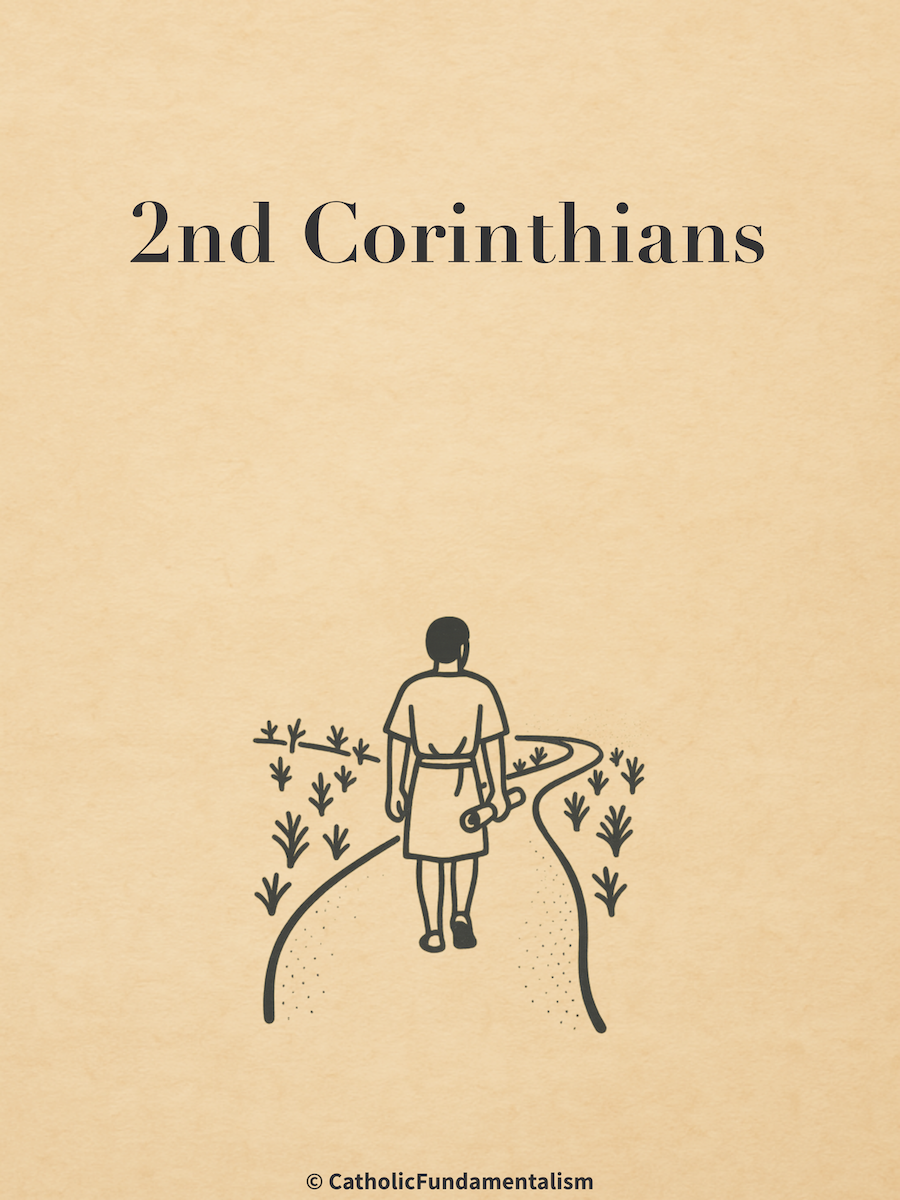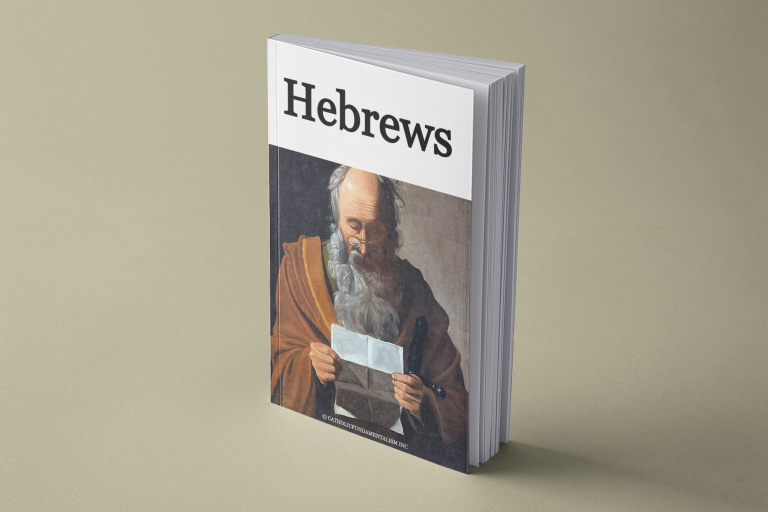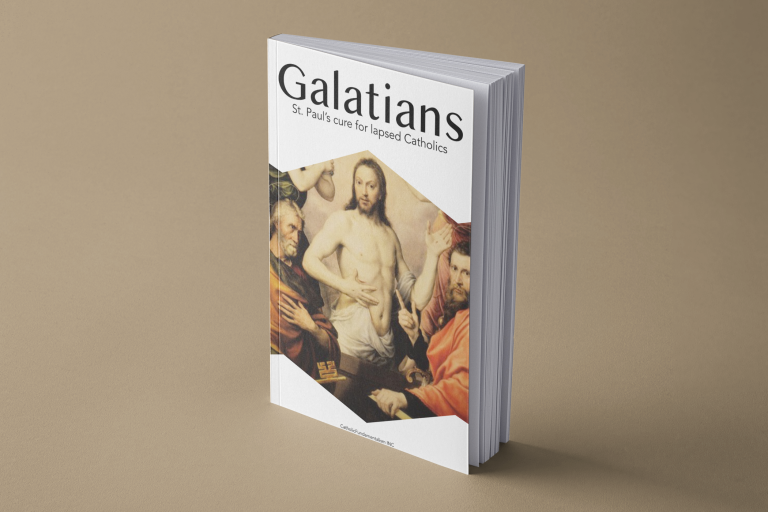Address and greetings. Thanksgiving
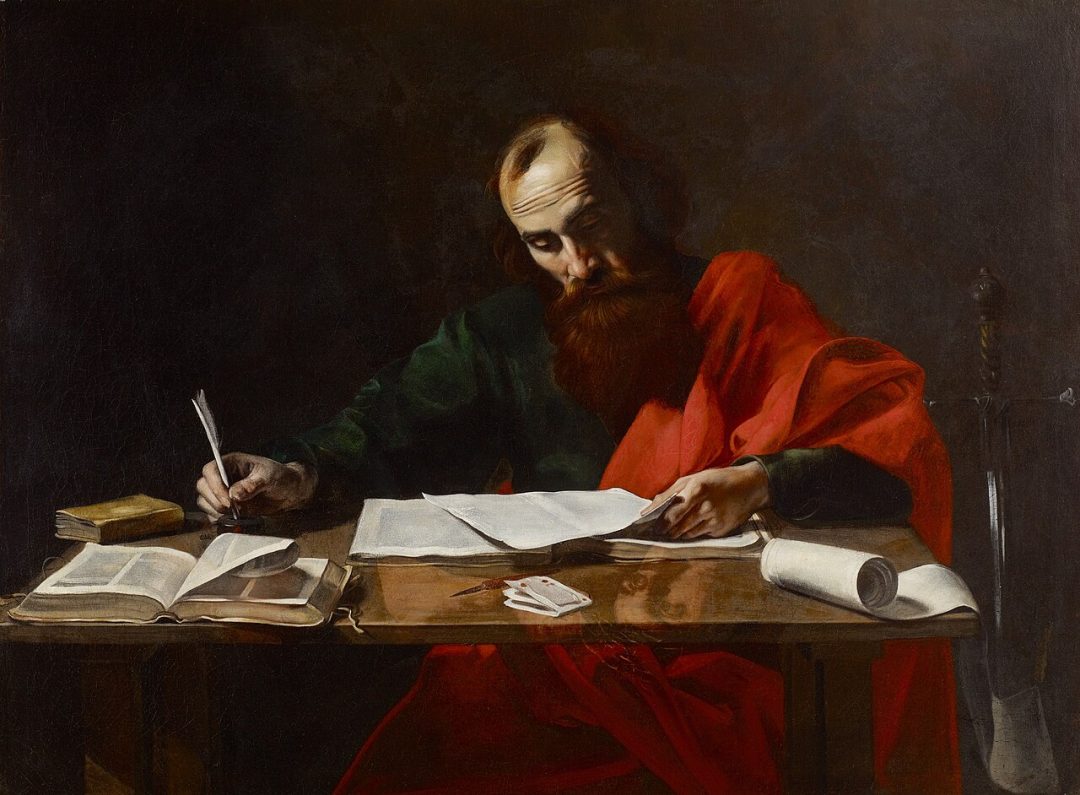
1:1 From Paul, appointed by God to be an apostle of Christ Jesus, and from Timothy, one of the brothers, to the church of God at Corinth and to all the saints in the whole of Achaia. (The “whole of Achaia” is the entirely of Southern Greece, including Athens, Sparta, Corinth, and other city-states in the area.)
1:2 Grace and peace to you from God our Father and the Lord Jesus Christ.
1:3 Blessed be the God and Father of our Lord Jesus Christ, a gentle Father and the God of all consolation, (The “gentle Father” shows the true nature of God instead of the often punishing Deity of The Old Testament.)
1:4 who comforts us in all our sorrows, so that we can offer others, in their sorrows, the consolation that we have received from God ourselves.
1:5 Indeed, as the sufferings of Christ overflow to us, so, through Christ, does our consolation overflow. (That “consolation” begins to “overflow” within us as we obey The Call to Catholic Communion provided by priests Ordained in Living Link with “And I say unto you thou art Peter and on this rock I build My Church and the gates of hell shall not prevail against it. I give you the keys to The Kingdom of Heaven.”)
1:6 When we are made to suffer, it is for your consolation and salvation. When, instead, we are comforted, this should be a consolation to you, supporting you in patiently bearing the same sufferings as we bear. (Catholic priests, Bishops, and religious were “patiently bearing the same sufferings” as many early Catholics.)
1:7 And our hope for you is confident, since we know that, sharing our sufferings, you will also share our consolations. (The “consolations” for being Catholic are eternal, providing us with “the keys to The Kingdom of Heaven” that Jesus gave only to Peter.)
1:8 For we should like you to realize, brothers, that the things we had to undergo in Asia were more of a burden than we could carry, so that we despaired of coming through alive.
1:9 Yes, we were carrying our own death warrant with us, and it has taught us not to rely on ourselves but only on God, who raises the dead to life. (When hatred for Catholics emerges, as it has in every nation for the past 2,000 years, we are all “carrying our own death warrant with us.”
1:10 And He saved us from dying, as He will save us again; yes, that is our firm hope in Him, that in the future He will save us again. (Hebrews 13:8 “Jesus Christ is the same yesterday, today, and forever.”)
1:11 You must all join in the prayers for us: the more people there are asking for help for us, the more will be giving thanks when it is granted to us.
St Paul reviews some recent events and explained why he changed his plans
1:12 There is one thing we are proud of, and our conscience tells us it is true: that we have always treated everybody, and especially you, with the reverence and sincerity which come from God, and by the grace of God we have done this without ulterior motives. (In a similar way, we who strive to be good Catholics must treat “everybody with the reverence and sincerity which come from God.”)
1:13 There are no hidden meanings in our letters besides what you can read for yourselves and understand. (One type of Protestant Personality endlessly looks for “secret meanings” to avoid simple striving to “Love God and your neighbors as yourself.”)
1:14 And I hope that, although you do not know us very well yet, you will have come to recognize, when the day of our Lord Jesus comes, that you can be as proud of us as we are of you.
1:15 Because I was so sure of this, I had meant to come to you first, so that you would benefit doubly;
1:16 staying with you before going to Macedonia and coming back to you again on the way back from Macedonia, for you to see me on my way to Judaea.
1:17 Do you think I was not sure of my own intentions when I planned this? Do you really think that when I am making my plans, my motives are ordinary human ones, and that I say Yes, yes, and No, no, at the same time?
1:18 I swear by God’s truth, there is no Yes and No about what we say to you. (We compare that perfect definition of Protestantism to who all say, “Yes!, I believe in Jesus but “No!”, but I do not believe in His Church-Creating Word to The First Pope: “And I say unto you thou art Peter and on this rock I build My Church and the gates of hell shall not prevail against it.” By saying “No!” to that, many reject “the keys to The Kingdom of Heaven”.)
1:19 The Son of God, the Christ Jesus that we proclaimed among you – I mean Silvanus (The name means: “of the woods”) and Timothy (“honoring God”) and I – was never Yes and No: with him it was always Yes,
1:20 and however many the promises God made, the Yes to them all is in him. That is why it is ‘through him’ that we answer Amen to the praise of God. (Again, Catholics say “Yes!” and obey The Call to Catholic Communion Jesus repeated 12 times in the last half of John 6 and twice more at The Last Supper: “If you do not eat My Body and drink My Blood you do not have life in you.”
1:21 Remember it is God himself who assures us all, and you, of our standing in Christ, and has anointed us,
1:22 marking us with his seal and giving us the pledge, the Spirit, that we carry in our hearts. (Catholic souls are “marked with His seal” so we know we may be forever among “You are My friends if you obey My commands.”, John 15:14)
1:23 By my life, I call God to witness that the reason why I did not come to Corinth after all was to spare your feelings.
1:24 We are not dictators over your faith, but are fellow workers with you for your happiness; in the faith you are steady enough. (May every Catholic be a “fellow worker” with those “who labor in the vineyard.” Mt 20:1-16)
St. Paul sends “Greetings!” and prefers to write, rather than visit:
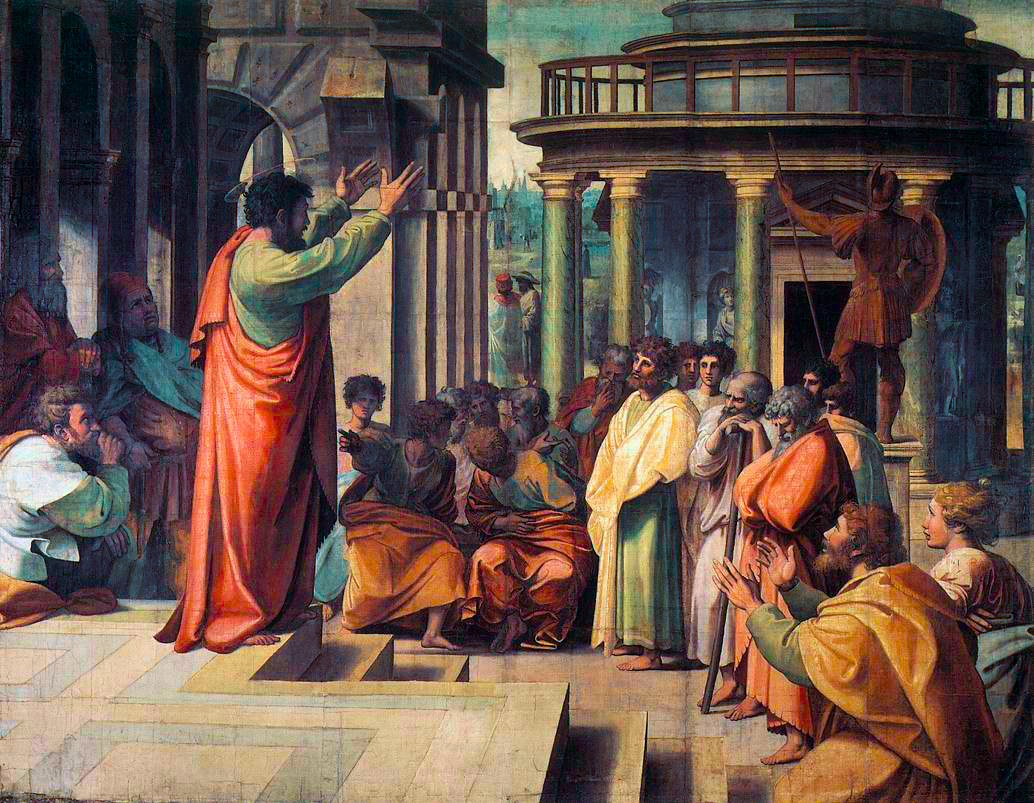
2:1 Well then, I made up my mind not to pay you a second distressing visit.
2:2 I may have hurt you, but if so I have hurt the only people who could give me any pleasure.
2:3 I wrote as I did to make sure that, when I came, I should not be distressed by the very people who should have made me happy. I am sure you all know that I could never be happy unless you were.
2:4 When I wrote to you, in deep distress and anguish of mind, and in tears, it was not to make you feel hurt but to let you know how much love I have for you.
2:5 Someone has been the cause of pain; and the cause of pain not to me, but to some degree – not to overstate it – to all of you.
2:6 The punishment already imposed by the majority on the man in question is enough; (This “man in question” may be the man described in 1 Cor. 5:1-12 who was “living with his father’s wife”. St. Paul thought he should “have been expelled from the community”.
2:7 and the best thing now is to give him your forgiveness and encouragement, or he might break down from so much misery. (Now, such sinners must receive “forgiveness and encouragement” so they may begin to grow in Faith and not be lost.)
2:8 So I am asking you to give some definite proof of your love for him.
2:9 What I really wrote for, after all, was to test you and see whether you are completely obedient.
2:10 Anybody that you forgive, I forgive; and as for my forgiving anything – if there has been anything to be forgiven, I have forgiven it for your sake in the presence of Christ.
2:11 And so we will not be outwitted by Satan – we know well enough what his intentions are. (His “intent” is to keep every soul on earth from being Catholic enough to get “the keys to The Kingdom of Heaven”.)
From Troas to Macedonia. The apostolate: its importance in the area from Troy, where many early Greeks came from, to Macedonia and the rest of Greece
2:12 When I went up to Troas to preach the Good News of Christ, and the door was wide open for my work there in the Lord,
2:13 I was so continually uneasy in mind at not meeting brother Titus there, I said good-bye to them and went on to Macedonia.
2:14 Thanks be to God who, wherever he goes, makes us, in Christ, partners of his triumph, and through us is spreading the knowledge of Himself, like a sweet smell, everywhere.
2:15 We are Christ’s incense to God for those who are being saved and for those who are not; (We see that not only sights and sounds help us be Catholic, but also the smells of Holy Incense entering the part of our mind that responds to them.)
2:16 for the last, the smell of death that leads to death, for the first the sweet smell of life that leads to life. And who could be qualified for work like this? (Those involved in homicide investigations are particularly aware of “the smell of death”.)
2:17 At least we do not go round offering the word of God for sale, as many other people do. In Christ, we speak as men of sincerity, as envoys of God and in God’s presence. (The living proof of the “sincerity” of Catholic priests and religious is proven by their Holy Vows of Chastity, Obedience, and Poverty.)
St. Paul reminds his readers: Listen to Jesus!
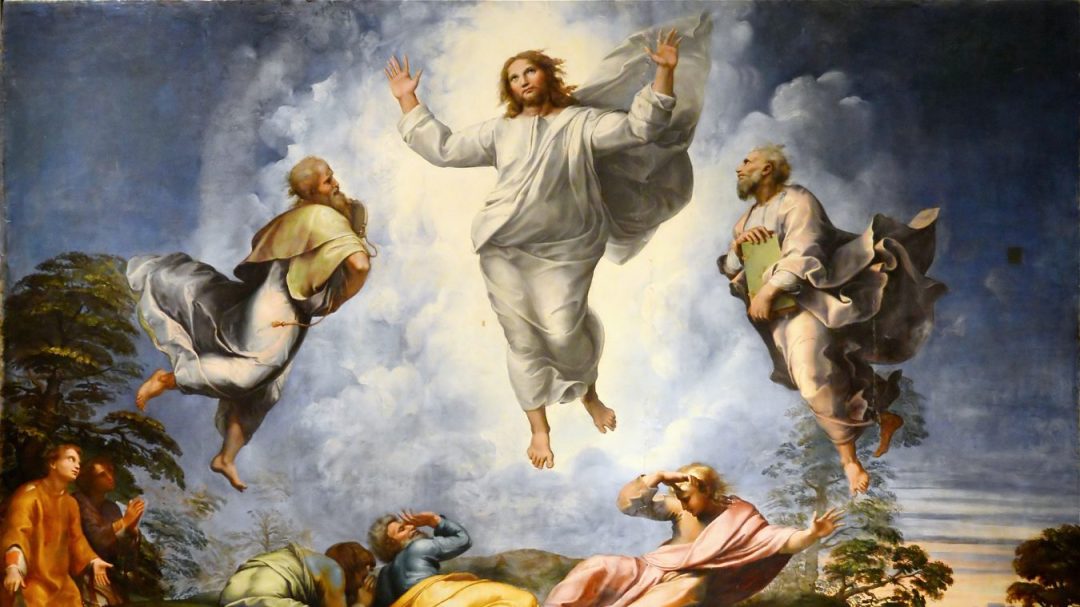
3:1 Does this sound like a new attempt to commend ourselves to you? Unlike other people, we need no letters of recommendation either to you or from you,
3:2 because you are yourselves our letter, (Every Catholic becomes a living Word of God), written in our hearts, that anybody can see and read,
3:3 and it is plain that you are a letter from Christ, drawn up by us, and written not with ink but with the Spirit of the living God, not on stone tablets but on the tablets of your living hearts.
3:4 Before God, we are confident of this through Christ:
3:5 not that we are qualified in ourselves to claim anything as our own work: all our qualifications come from God. (The “qualification” takes human form in those who take the Holy Vows of Celibacy, Obedience, and Poverty.)
3:6 He is the one who has given us the qualifications to be the administrators of this new covenant, which is not a covenant of written letters but of the Spirit: the written letters bring death, but the Spirit gives life. (“the Spirit gives life” to God’s “administrators of this new covenant”, His Catholic Bishops.)
3:7 Now if the administering of death, in the written letters engraved on stones, was accompanied by such a brightness that the Israelites could not bear looking at the face of Moses, though it was a brightness that faded,
3:8 then how much greater will be the brightness that surrounds the administering of the Spirit!
3:9 For if there was any splendor in administering condemnation, there must be very much greater splendor in administering justification.
3:10 In fact, compared with this greater splendor, the thing that used to have such splendor now seems to have none; (This refers to leaders of every non-Catholic faith.)
3:11 and if what was so temporary had any splendor, there must be much more in what is going to last for ever.
3:12 Having this hope, we can be quite confident.
3:13 not like Moses, who put a veil over his face so that the Israelites would not notice the ending of what had to fade.” (Many still resist over 300 of the Prophets’ predictions of Jesus.)
3:14 And anyway, their minds had been dulled; indeed, to this very day, that same veil is still there when the old covenant is being read, a veil never lifted, since Christ alone can remove it. (The only way to see and have the Light of God shining in us is to be Catholic.)
3:15 Yes, even today, whenever Moses is read, the veil is over their minds.
3:16 It will not be removed until they turn to the Lord. (This tells us that those who deny The Divinity of Jesus will continue to be “veiled” from His Light and Truth. It is hard for many of them to understand.)
3:17 Now this Lord is the Spirit, and where the Spirit of the Lord is, there is freedom.
3:18 And we, with our unveiled faces reflecting like mirrors the brightness of the Lord, all grow brighter and brighter as we are turned into the image that we reflect; this is the work of the Lord who is Spirit. (The more Catholic we are, the brighter our light will shine. Catholics wonder if the “gates to The Kingdom of Heaven” are some sort of “Divine Light-meter” that the dim bulbs can neither see nor find.)
God’s Mercy keeps St. Paul and the other earlly Catholics in obedience to Jesus:
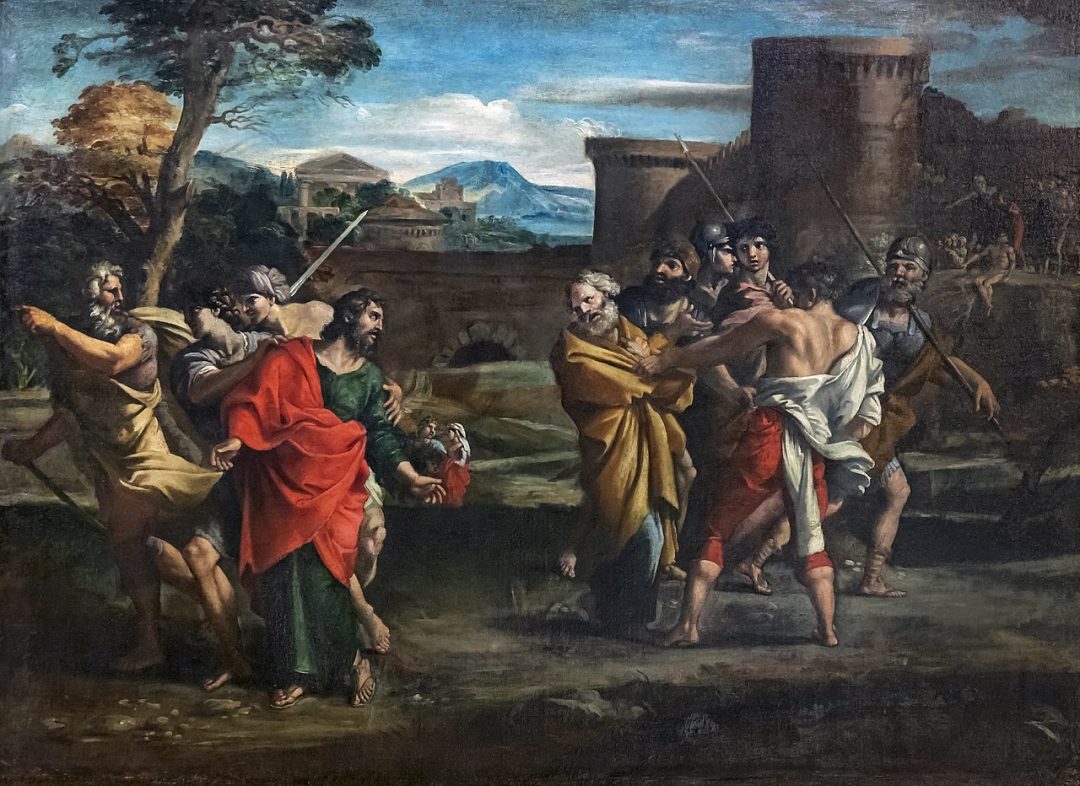
4:1 Since we have by an act of mercy been entrusted with this work of administration, there is no weakening on our part.
4:2 On the contrary, we will have none of the reticence of those who are ashamed, deceitfulness or watering down the word of God; but the way we commend ourselves to every human being with a conscience is by stating the truth openly in the sight of God. (We may help those blessed to have a “conscience” to remind them of The Church-Founding Catholic Truth to which they are hopefully only temporarily “veiled:”: “And I say unto you thou art Peter and on this rock I build My Church and the gates of hell shall not prevail against it. I give you the keys to The Kingdom of Heaven.”
4:3 If our gospel does not penetrate the veil, then the veil is on those who are not on the way to salvation; (There are few reasons clearer than this to “Be Catholic!”)
4:4 the unbelievers whose minds the god of this world has blinded, to stop them seeing the light shed by the Good News of the glory of Christ, who is the image of God. (St. Paul reminds us of the dangers from the “gods of this world”, a distinction we should never be afraid to describe. They hide behind any number of “veils”, the first of which was torn open in the temple (Mt. 27:51) at the moment of Jesus’ death.)
4:5 For it is not ourselves that we are preaching, but Christ Jesus as the Lord, and ourselves as your servants for Jesus’ sake. (Unlike other clergy, Catholic priests to obey The Church- Creating Word of Jesus in Mt. 16:18-20, “Thou are Peter and on this rock I build My Church . ..”)
4:6 It is the same God that said, ‘Let there be light shining out of darkness’ (John 1:5), who has shone in our minds to radiate the light of the knowledge of God’s glory, the glory on the face of Christ.
The trials and hopes of the Apostles of Jesus and His Church:
4:7 We are only the earthenware jars that hold this treasure, to make it clear that such an overwhelming power comes from God and not from us. (The cheapest “earthenware jars” are compared to the humility of Catholic priests and religious instead of seeing them as expensive stone and precious metals.)
4:8 We are in difficulties on all sides, but never cornered; we see no answer to our problems, but never despair; (The Church has an answer to every problem, not only in the short Catholic Catechism, but in the hundreds of thousands of volumes in Catholic libraries.)
4:9 we have been persecuted, but never deserted; knocked down, but never killed; (It is the Catholic souls who are never “killed”.)
4:10 always, wherever we may be, we carry with us in our body the death of Jesus, so that the life of Jesus, too, may always be seen in our body. (That “life of Jesus” becomes a living part of us when we receive Catholic Communion and have His Body and Blood giving us “life”.)
4:11 Indeed, while we are still alive, we are consigned to our death every day, for the sake of Jesus, so that in our mortal flesh the life of Jesus, too, may be openly shown. (Every temptation we resist lets us shine more brightly.)
4:12 So death is at work in us, but life in you.
4:13 But as we have the same spirit of faith that is mentioned in scripture – I believed, and therefore I spoke– we too believe and therefore we too speak,
4:14 knowing that he who raised the Lord Jesus to life will raise us with Jesus in our turn, and put us by His side and you with us. (Catholics who die after a Good Confession will be “by the side of Jesus” and His blessed Saints.)
4:15 You see, all this is for your benefit, so that the more grace is multiplied among people, the more thanksgiving there will be, to the glory of God. (Jesus died so that everyone may choose to follow Him and be saved.)
4:16 That is why there is no weakening on our part, and instead, though this outer man of ours may be falling into decay, the inner man is renewed day by day. (Our mind and bodies “decay” every day while our souls are renewed by The Seven Catholic Sacraments.)
4:17 Yes, the troubles which are soon over, though they weigh little, train us for the carrying of a weight of eternal glory which is out of all proportion to them.
4:18 And so we have no eyes for things that are visible, but only for things that are invisible; for visible things last only for a time, and the invisible things are eternal. (Earthly things are distractions. We should focus on God and not on them.)
St. Paul teaches us to think about what happens “when our tent is folded” and we go to Judgment:
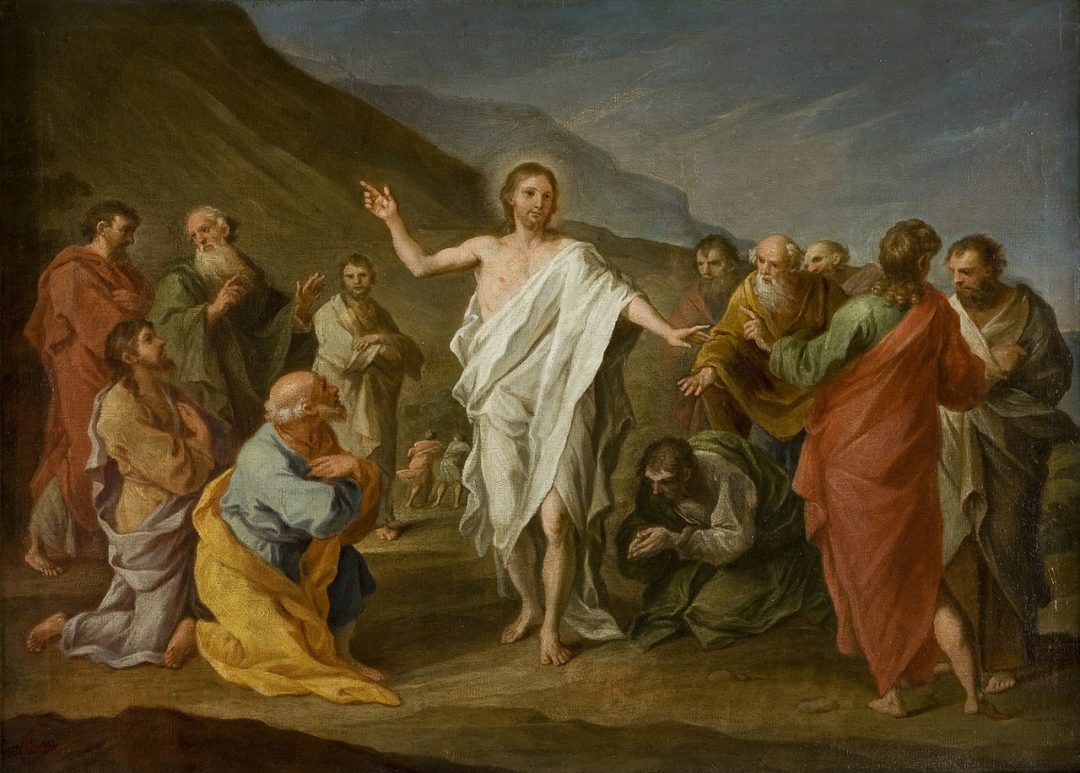
5:1 For we know that when the tent that we live in on earth is folded up, there is a house built by God for us, an everlasting home not made by human hands, in the heavens.
5:2 In this present state, it is true, we groan as we wait with longing to put on our heavenly home over the other;
5:3 we should like to be found wearing clothes and not without them.
5:4 Yes, we groan and find it a burden being still in this tent, not that we want to strip it off, but to put the second garment over it and to have what must die taken up into life. (The soul may have something worse than be made to “die” if we go to Judgment in willful disobedience to Jesus.)
5:5 This is the purpose for which God made us, and he has given us the pledge of the Spirit.
- 5:6 We are always full of confidence, then, when we remember that to live in the body means to be exiled from the Lord, (May that Passage alert all of us to live so that we do not spend eternity with our immortal soul “exiled from the Lord”.)
5:7 going as we do by faith and not by sight
5:8 -we are full of confidence, I say, and actually want to be exiled from the body and make our home with the Lord.
5:9 Whether we are living in the body or exiled from it, we are intent on pleasing him. (May this be the goal reached by all the world.)
5:10 For all the truth about us will be brought out in the law court of Christ, and each of us will get what he deserves for the things he did in the body, good or bad. (Is there a better reason to live by the Word of Jesus to His Catholic priests “Those whose sins you forgive on earth are forgiven in Heaven.” (John 20:23)
What God’s Apostles do:
5:11 And so it is with the fear of the Lord in mind that we try to win people over. God knows us for what we really are, and I hope that in your consciences you know us too.
5:12 This is not another attempt to commend ourselves to you: we are simply giving you reasons to be proud of us, so that you will have an answer ready for the people who can boast more about what they seem than what they are. (This is a brilliant description of all who proudly say: “I know more than Jesus about some things!”)
5:13 If we seemed out of our senses, it was for God; but if we are being reasonable now, it is for your sake.
5:14 And this is because the love of Christ overwhelms us when we reflect that if one man has died for all, then all men should be dead;
5:15 and the reason He died for all was so that living men should live no longer for themselves, but for Him Who died and was raised to life for them.
5:16 From now onwards, therefore, we do not judge anyone by the standards of the flesh. Even if we did once know Christ in the flesh, that is not how we know Him now.
5:17 And for anyone who is in Christ, there is a new creation; the old creation has gone, and now the new one is here. (This “New Creation” is a world that gives “the keys to The Kingdom of Heaven” to those who are Catholic enough to get them.)
5:18 It is all God’s work. It was God who reconciled us to Himself through Christ and gave us the work of handing on this reconciliation. (Every Catholic who shares reasons to “Be Catholic!” is doing God’s Work by “Handing on this recollection”.)
5:19 In other words, God in Christ was reconciling the world to Himself, not holding men’s faults against them, and He has entrusted to us the news that they are reconciled.
5:20 So we are ambassadors for Christ; it is as though God were appealing through us, and the appeal that we make in Christ’s name is: be reconciled to God. (May all be “reconciled” enough to get “the keys to The Kingdom of Heaven” that Jesus died to leave to His First Catholic Pope.)
5:21 For our sake God made the sinless one into sin, so that in Him we might become the goodness of God. (Again, we become “the goodness of God” by obeying His Call to Catholic Communion, “If you do not eat My Body and drink My Blood you do not have life in you.” He did repeat that 12 times in John 6 and twice more at The Last Supper. May all be blessed to stop avoiding That Simple Bible Fact.)
We are warned: “Do not reject The Grace of God!”
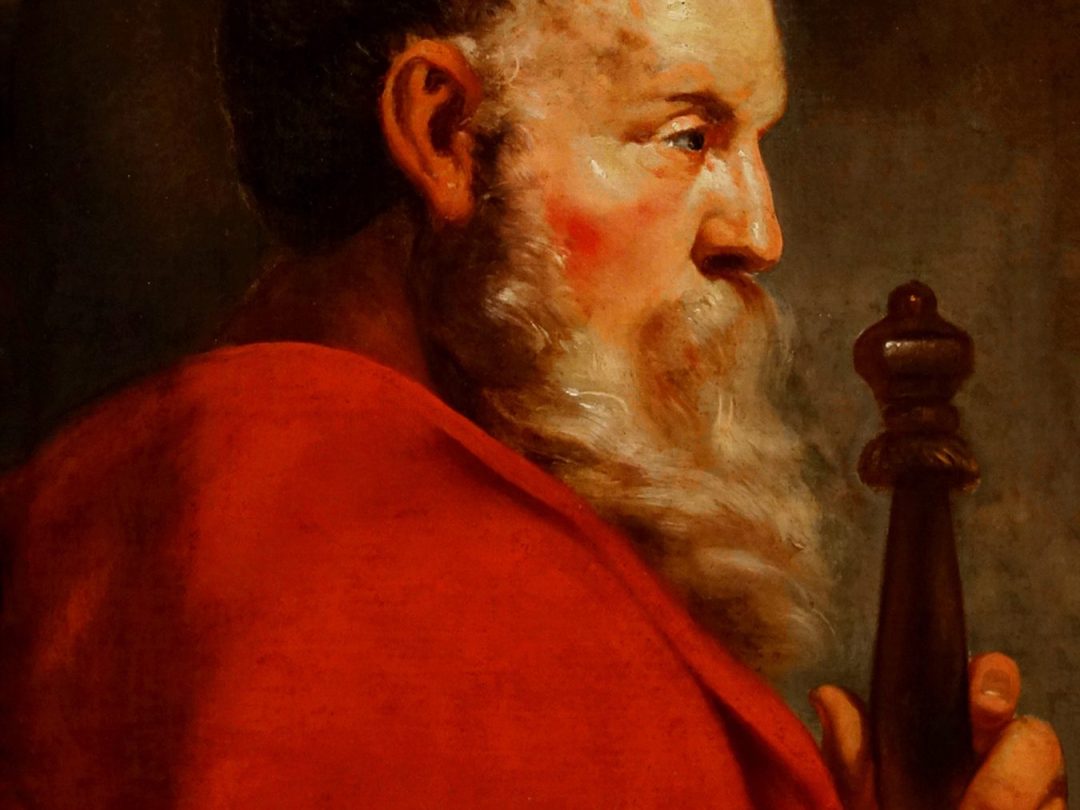
6:1 As His fellow workers, we beg you once again not to neglect the grace of God that you have received.
6:2 For he says: At the favorable time, I have listened to you; on the day of salvation I came to your help. (Isaiah 49:8) Well, now is the favorable time; this is the day of salvation. (May all be blessed to “Be Catholic” quickly after knowing what we repeat at every opportunity: “And I say unto you thou art Peter and on this rock I build My Church and the gates of hell shall not prevail against it. I give you the keys to The Kingdom of Heaven.”!)
6:3 We do nothing that people might object to, so as not to bring discredit on our function as God’s servants. (Catholic evangelists are held to a high standard!)
6:4 Instead, we prove we are servants of God by great fortitude in times of suffering: in times of hardship and distress;
6:5 when we are flogged, or sent to prison, or mobbed; laboring, sleepless, starving.
6:6 We prove we are God’s servants by our purity, knowledge, patience and kindness; by a spirit of holiness, by a love free from affectation. (Purity, knowledge, patience, and kindness are the keys to getting “the keys to The Kingdom of Heaven.”)
6:7 by the word of truth and by the power of God; by being armed with the weapons of righteousness in the right hand and in the left,
6:8 prepared for honor or disgrace, for blame or praise; taken for impostors while we are genuine;
6:9 obscure yet famous; said to be dying and here are we alive; rumored to be executed before we are sentenced.
6:10 thought most miserable and yet we are always rejoicing; taken for paupers though we make others rich, for people having nothing though we have everything.
Paul opens his heart. A warning
6:11 Corinthians, we have spoken to you very frankly; our mind has been opened in front of you.
6:12 Any constraint that you feel is not on our side; the constraint is in your own selves.
6:13 I speak as if to children of mine: as a fair exchange, open your minds in the same way.
6:14 Do not harness yourselves in an uneven team with unbelievers. (Work with Catholics, not with those who oppose His Church, because) Virtue is no companion for crime. Light and darkness have nothing in common.
6:15 Christ is not the ally of Beliar, nor has a believer anything to share with an unbeliever.
6:16 The temple of God has no common ground with idols, and that is what we are – the temple of the living God. We have God’s word for it: I will make my home among them and live with them; I will be their God and they shall be my people.” (Genesis 17:7, Exodus 6:7, Ezekiel 34:17)
6:17 Then come away from them and keep aloof, says the Lord. Touch nothing that is unclean, (Isaiah 52:11) and I will welcome you
6:18 and be your father, and you shall be my sons and daughters, says the Almighty Lord.
(Psalm 2:1-7)
“Wash away all that can soil either body or spirit!”
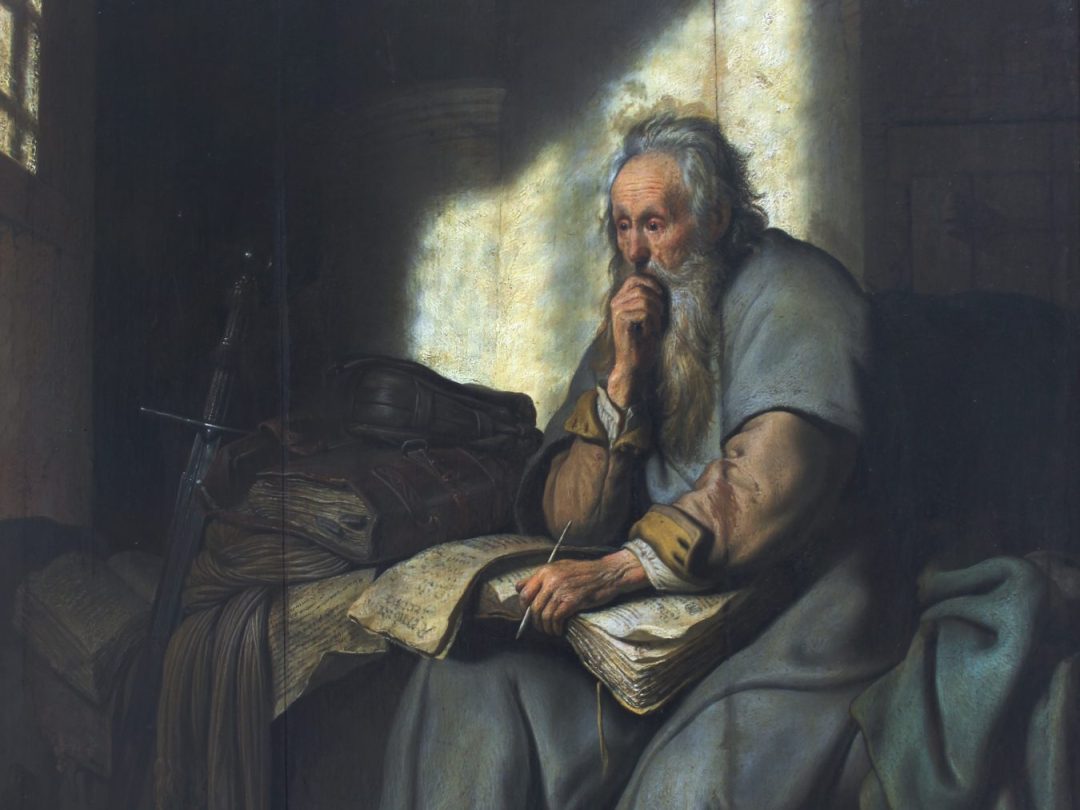
7:1 With promises like these made to us, dear brothers, let us wash off all that can soil either body or spirit, to reach perfection of holiness in the fear of God.
7:2 Keep a place for us in your hearts. We have not injured anyone, or ruined anyone, or exploited anyone. (Every person in Corinth, and the rest of the world, passed by countless temples run by those who “exploited” everyone they could with everything they thought, said, and did.)
7:3 I am not saying this to put any blame on you; as I have already told you, you are in our hearts – together we live or together we die.
7:4 I have the very greatest confidence in you, and I am so proud of you that in all our trouble I am filled with consolation and my joy is overflowing.
Paul in Macedonia; he is joined by Titus
7:5 Even after we had come to Macedonia, however, there was no rest for this body of ours. Far from it; we found trouble on all sides: quarrels outside, misgivings inside.
7:6 But God comforts the miserable, and He comforted us, by the arrival of Titus,
7:7 and not only by his arrival but also by the comfort which he had gained from you. He has told us all about how you want to see me, how sorry you were, and how concerned for me, and so I am happier now than I was before. (The successful teaching of St. Paul was a joy for him to behold.)
7:8 But to tell the truth, even if I distressed you by my letter, I do not regret it. I did regret it before, and I see that that letter did distress you, at least for a time;
7:9 but I am happy now – not because I made you suffer, but because your suffering led to your repentance. Yours has been a kind of suffering that God approves, and so you have come to no kind of harm from us.
7:10 To suffer in God’s way means changing for the better and leaves no regrets, but to suffer as the world knows suffering brings death.
7:11 Just look at what suffering in God’s way has brought you: what keenness, what explanations, what indignation, what alarm! Yes, and what aching to see me, what concern for me, and what justice done! In every way you have shown yourselves blameless in this affair.
7:12 So then, though I wrote the letter to you, it was not written for the sake either of the offender or of the one offended; it was to make you realize, in the sight of God, your own concern for us.
7:13 That is what we have found so encouraging. With this encouragement, too, we had the even greater happiness of finding Titus so happy; thanks to you all, he has no more worries;
7:14 I had rather boasted to him about you, and now I have not been made to look foolish; in fact, our boasting to Titus has proved to be as true as anything that we ever said to you.
7:15 His own personal affection for you is all the greater when he remembers how willing you have all been, and with what deep respect you welcomed him.
7:16 I am very happy knowing that I can rely on you so completely. (May we strive to be as worthy of God’s praise as the Corinthians!)
Paul considers the Collection and encourages generosity with the example of early Catholics in Macedonia
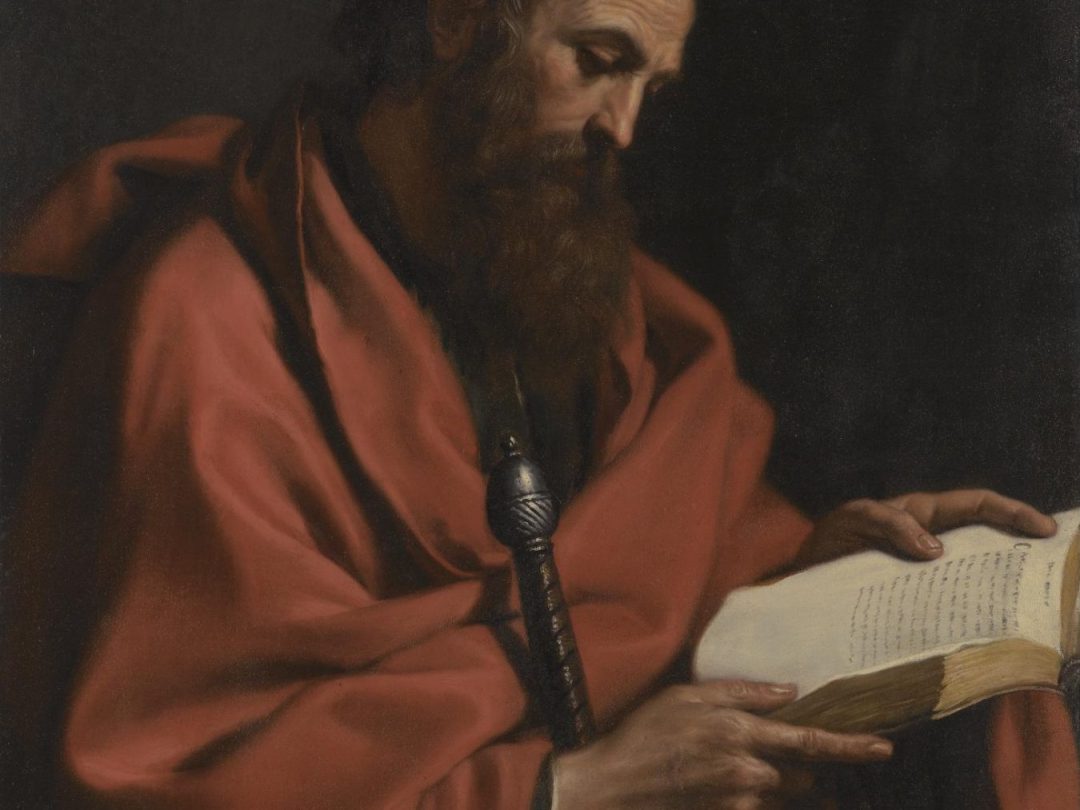
8:1 Now here, brothers, is the news of the grace of God which was given in the churches in Macedonia;
8:2 and of how, throughout great trials by suffering, their constant cheerfulness and their intense poverty have overflowed in a wealth of generosity. (“cheerfulness” and “intense poverty” are the goals Catholics seek, a mystery to the world.)
8:3 I can swear that they gave not only as much as they could afford, but far more, and quite spontaneously,
8:4 begging and begging us for the favor of sharing in this service to the saints
8:5 and, what was quite unexpected, they offered their own selves first to God and, under God, to us.
8:6 Because of this, we have asked Titus, since he has already made a beginning, to bring this work of mercy to the same point of success among you.
8:7 You always have the most of everything – of faith, of eloquence, of understanding, of keenness for any cause, and the biggest share of our affection – so we expect you to put the most into this work of mercy too. (May all Catholics be as generous as those in Macedon and as generous as Paul encouraged the Corinthians to be.)
8:8 It is not an order that I am giving you; I am just testing the genuineness of your love against the keenness of others. (We take the most generous Catholics as our guide.)
8:9 Remember how generous the Lord Jesus was: He was rich, but He became poor for your sake, to make you rich out of His poverty.
8:10 As I say, I am only making a suggestion; it is only fair to you, since you were the first, a year ago, not only in taking action but even in deciding to.
8:11 So now finish the work and let the results be worthy, as far as you can afford it, of the decision you made promptly.
8:12 As long as the readiness is there, a man is acceptable with whatever he can afford; never mind what is beyond his means. (We must ask ourselves, “What can we “afford” to give to help The Church?”
8:13 This does not mean that to give relief to others you ought to make things difficult for yourselves: it is a question of balancing
8:14 what happens to be your surplus now against their present need, and one day they may have something to spare that will supply your own need. That is how we strike a balance:
8:15 as scripture says: The man who gathered much had none too much, the man who gathered little did not go short. (Exodus 16:18)
More delegates would be sent to the Corinthians
8:16 I thank God for putting into Titus’ heart the same concern for you that I have myself.
8:17 He did what we asked him; indeed he is more concerned than ever, and is visiting you on his own initiative.
8:18 As his companion we are sending the brother who is famous in all the churches for spreading the gospel. (The unnamed “brother” may have been Luke, who wrote more than 1/4th of The New Testament.)
8:19 More than that, he happens to be the same brother who has been elected by the churches to be our companion on this errand of mercy that, for the glory of God, we have undertaken to satisfy our impatience to help.
8:20 We hope that in this way there will be no accusations made about our administering such a large fund; (All offerings must be strictly accounted for so that no “accusations” of financial impropriety can be made by those seeking to undermine The Catholic Church.)
8:21 for we are trying to do right not only in the sight of God but also in the sight of men.[*b]
8:22 To accompany these, we are sending a third brother, of whose keenness we have often had proof in many different ways, and who is particularly keen about this, because he has great confidence in you.
8:23 Titus, perhaps I should add, is my own colleague and fellow worker in your interests; the other two brothers, who are delegates of the churches, are a real glory to Christ.
8:24 So then, in front of all the churches, give them a proof of your love, and prove to them that we are right to be proud of you.
Catholics are told to “offer our services to the Saints!”
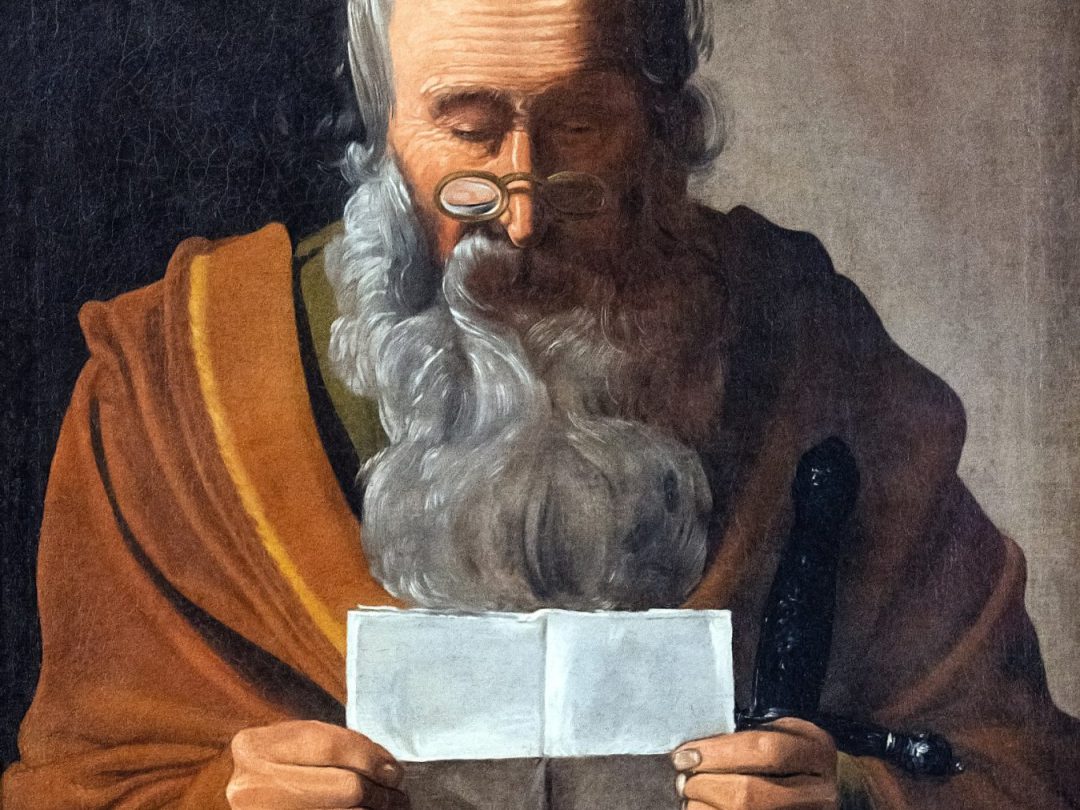
9:1 There is really no need for me to write to you on the subject of offering your services to the saints,
9:2 since I know how anxious you are to help; in fact, I boast about you to the Macedonians, telling them, ‘Achaia has been ready since last year’. So your zeal has been a spur to many more. (“Achaia” encompassed most of Greece that was South of Macedonia. It has been a large, important area since the Myceneans, over a thousand years before.)
9:3 I am sending the brothers all the same, to make sure that our boasting about you does not prove to have been empty this time, and that you really are ready as I said you would be.
9:4 If some of the Macedonians who are coming with me found you unprepared, we should be humiliated – to say nothing of yourselves – after being so confident.
9:5 That is why I have thought it necessary to ask these brothers to go on to you ahead of us, and make sure in advance that the gift you promised is all ready, and that it all comes as a gift out of your generosity and not by being extorted from you.
Paul explains how important it is to be generous!
9:6 Do not forget: thin sowing means thin reaping; the more you sow, the more you reap.
9:7 Each one should give what he has decided in his own mind, not grudgingly or because he is made to, for God loves a cheerful giver. (Deuteronomy 15:10)
9:8 And there is no limit to the blessings which God can send you – he will make sure that you will always have all you need for yourselves in every possible circumstance, and still have something to spare for all sorts of good works.
9:9 As scripture says: He was free in almsgiving, and gave to the poor: his good deeds will never be forgotten. (Psalm 112:9)
9:10 The one who provides seed for the sower and bread for food will provide you with all the seed you want and make the harvest of your good deeds a larger one,
9:11 and, made richer in every way, you will be able to do all the generous things which, through us, are the cause of thanksgiving to God. (The only reason for “riches” is to serve God and our neighbor.)
9:12 For doing this holy service is not only supplying all the needs of the saints, but it is also increasing the amount of thanksgiving that God receives.
9:13 By offering this service, you show them what you are, and that makes them give glory to God for the way you accept and profess the gospel of Christ, and for your sympathetic generosity to them and to all.
9:14 And their prayers for you, too, show how they are drawn to you on account of all the grace that God has given you. (Generosity attracts people who want to be pleasing to God.)
9:15 Thanks be to God for his inexpressible gift!
Paul’s reply to accusations of weakness:
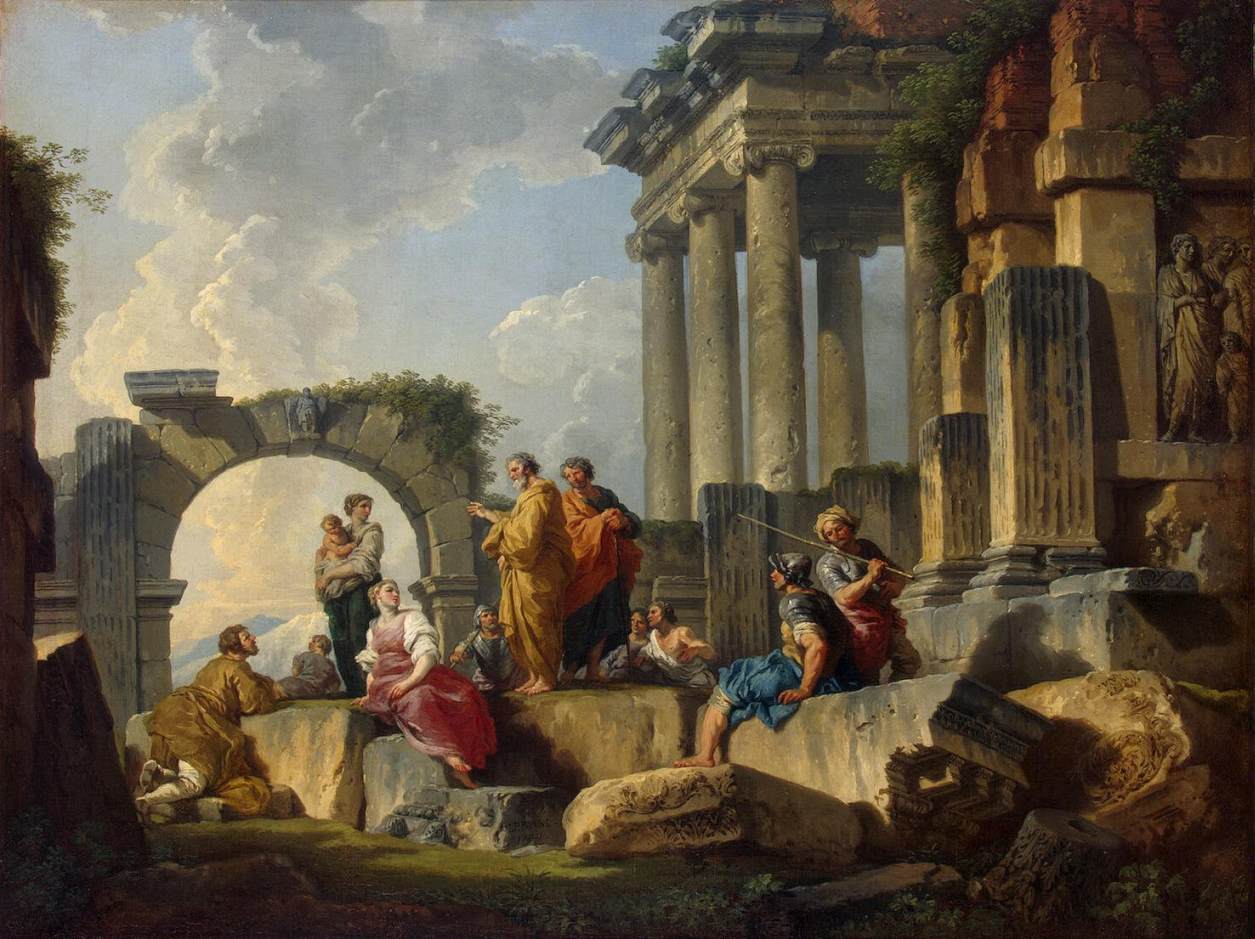
10:1 This is a personal matter; this is Paul himself appealing to you by the gentleness and patience of Christ – I, the man who is so humble when he is facing you, but bullies you when he is at a distance.
10:2 I only ask that I do not have to bully you when I come, with all the confident assurance I mean to show when I come face to face with people I could name who think we go by ordinary human motives.
10:3 We live in the flesh, of course, but the muscles that we fight with are not flesh.
Paul warns of The Profiteers of Protestanism:
10:4 Our war is not fought with weapons of flesh, yet they are strong enough, in God’s cause, to demolish fortresses (built of Protestant vanities). We demolish sophistries (that defend Protestant vanities),
10:5 and the arrogance (the vanity of Protestant vanities) that tries to resist the knowledge of God; every thought is our prisoner, captured to be brought into obedience to Christ. (May all Protestant vanities become respectful to Every Teaching of Jesus, including His Church-Creating Decree to His First Catholic Pope in Mt. 16:18-20, “And I say unto you . . .”)
10:6 Once you have given your complete obedience (showing you have overcome every Protestant vanity), we are prepared to punish any disobedience.
10:7 Face plain facts. Anybody who is convinced that he belongs to Christ must go on to reflect that we all belong to Christ no less than he does. (All Catholics “belong to Christ”.)
10:8 Maybe I do boast rather too much about our authority (“Maybe” also means “Maybe not”!), but the Lord gave it to me for building you up and not for pulling you down (into some self-serving vanity of Protestantism), and I shall not be ashamed of it.
10:9 I do not want you to think of me as someone who only frightens you by letter. (Meaning: “I am as devoutly Catholic in person as I am by letter.”)
10:10 Someone said, ‘He writes powerful and strongly-worded letters but when he is with you you see only half a man and no preacher at all’.
10:11 The man who said that can remember this: whatever we are like in the words of our letters when we are absent, that is what we shall be like in our actions when we are present. His reply to the accusation of ambition
10:12 We are not being so bold as to rank ourselves, or invite comparison, with certain people who write their own references. (Every Profiteer of Protestantism “writes their own references” while): Measuring themselves against themselves, and comparing themselves to themselves, they are simply foolish. (Is there a better, one-word understanding of every Willful Protestant for the past 4,000 years than “foolish”?)
10:13 We, on the other hand, are not going to boast without a standard to measure against: taking for our measure the yardstick which God gave us to measure with, which is long enough to reach to you (Everyone may choose to “measure” themselves and their ideas by seeing how obedient they are to Every Word of Jesus.)
10:14 We are not stretching further than we ought; otherwise we should not have reached you, as we did come all the way to you with the gospel of Christ. (We do not “reach” beyond the Teachings of Jesus to justify the self-serving thoughts within the Marketing Plans of Protestantism’s Profiteers.)
10:15 So we are not boasting without any measure, about work that was done by other people; in fact, we trust that, as your faith grows, we shall get taller and taller, when judged by our own standard.
10:16 I mean, we shall be carrying the gospel (God’s Teaching and not our self-serving opinions) to places far beyond you, without encroaching on anyone else’s field, not boasting of the work already done.
10:17 If anyone wants to boast, let him boast of the Lord. (Jeremiah 9:24)
10:18 It is not the man who commends himself that can be accepted, but the man who is commended by the Lord. (And “the Lord” does not commend anyone who willfullly and knowingly contradicts any Word of His.)
St Paul describes and predicts the source of Protestantism as self-serving ideas about Jesus for the coming 2,000 years::
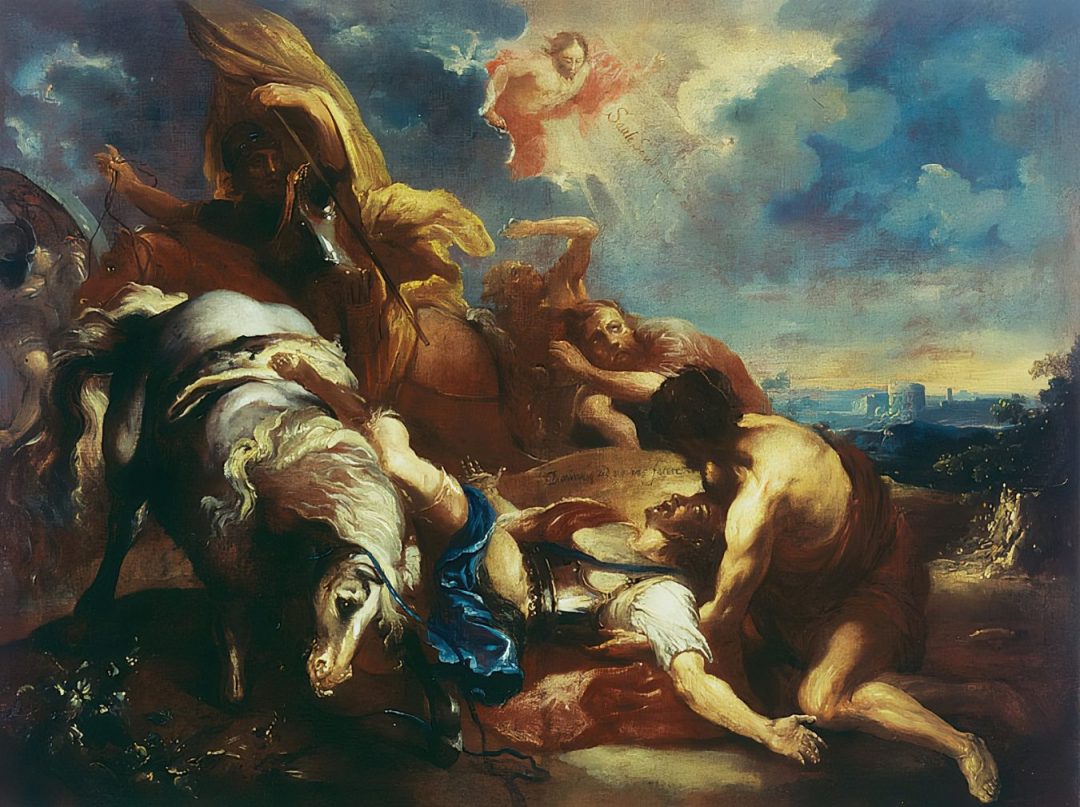
11:1 I only wish you were able to tolerate a little foolishness from me. But of course: you are tolerant towards me.
11:2 You see, the jealousy that I feel for you is God’s own jealousy: I arranged for you to marry Christ so that I might give you away as a chaste virgin to this one husband.
11:3 But the serpent, with his cunning, seduced Eve, and I am afraid that in the same way your ideas may get corrupted and turned away from simple devotion to Christ. (Paul compares the devil’s deception of Eve to Marketing Plans invented by Profiteers of Protestantism.)
11:4 Because any new-comer has only to proclaim a new Jesus, (That describes what every Profiteer of Protestantism has been doing for the past 2,000 years.) different from the one that we preached, or you have only to receive a new spirit, different from the one you have already received, or a new gospel, different from the one you have already accepted – and you welcome it with open arms. (The vulnerability of every person’s vanity is described: all are susceptible to being praised into disobeying Jesus and replacing His One, Holy, Catholic, and Apostolic Church with a belief that makes them feel good about themselves.)
11:5 As far as I can tell, these arch-apostles have nothing more than I have.
11:6 I may not be a polished speechmaker, but as for knowledge, that is a different matter; surely we have made this plain, speaking on every subject in front of all of you.
11:7 Or was I wrong, lowering myself so as to lift you high, by preaching the gospel of God to you and taking no fee for it?
11:8 I was robbing other churches living on them so that I could serve you.
11:9 When I was with you and ran out of money, I was no burden to anyone; the brothers who came from Macedonia provided me with everything I wanted. I was very careful, and I always shall be, not to be a burden to you in any way,
11:10 and by Christ’s truth in me, this cause of boasting will never be taken from me in the regions of Achaia. (“Achaia” refers to all the cities of Southern Greece where God’s Word was carried by St. Paul, Timothy, Luke, and other Catholic Evangelists.)
11:11 Would I do that if I did not love you? God knows I do.
11:12 I intend to go on doing what I am doing now – leaving no opportunity for those people who are looking for an opportunity to claim equality with us in what they boast of. (Their boast is always the same: “We know more than Jesus about which Church to be in.”)
11:13 These people are counterfeit apostles, they are dishonest workmen disguised as apostles of Christ. (Two descriptions of The Profiteers of Protestantism.)
11:14 There is nothing unexpected about that; if Satan himself goes disguised as an angel of light, is there is no need to be surprised when his servants, too, disguise themselves as the servants of righteousness. They will come to the end that they deserve. (St. Paul points out the demonic source and end results of all who encourage contradictions to Catholic Teachings.)
11:16 As I said before, let no one take me for a fool; but if you must, then treat me as a fool and let me do a little boasting of my own.
11:17 What I am going to say now is not prompted by the Lord, but said as if in a fit of folly, in the certainty that I have something to boast about.
11:18 So many others have been boasting of their worldly achievements, that I will boast myself.
11:19 You are all wise men and can cheerfully tolerate fools,
11:20 yes, even to tolerating somebody who makes slaves of you, makes you feed him, imposes on you, orders you about and slaps you in the face. (Arrogant people often force weaker people to believe they are serving God by serving them.)
11:21 I hope you are ashamed of us for being weak with you instead! But if anyone wants some brazen speaking – I am still talking as a fool – then I can be as brazen as any of them, and about the same things.
11:22 Hebrews, are they? So am I. Israelites? So am I. Descendants of Abraham? So am I.
11:23 The servants of Christ? I must be mad to say this, but so am I, and more than they: more, because I have worked harder, I have been sent to prison more often, and whipped many times more, often almost to death. (Few people in History have suffered as much as St. Paul for being Catholic!):
11:24 Five times I had the thirty-nine lashes from the Jews;
11:25 three times I have been beaten with sticks; once I was stoned; three times I have been shipwrecked and once adrift in the open sea for a night and a day.
11:26 Constantly traveling, I have been in danger from rivers and in danger from brigands, in danger from my own people and in danger from pagans; in danger in the towns, in danger in the open country, danger at sea and danger from so-called brothers.
11:27 I have worked and labored, often without sleep; I have been hungry and thirsty and often starving; I have been in the cold without clothes.
11:28 And, to leave out much more, there is my daily preoccupation: my anxiety for all the churches. (His “daily preoccupations” include endless prayers, conversations, travels, and hard work.)
11:29 When any man has had scruples, I have had scruples with him; when any man is made to fall, I am tortured. (Paul loves his neighbors enough to share their standards and sufferings.)
11:30 If I am to boast, then let me boast of my own feebleness.
11:31 The God and Father of the Lord Jesus – bless him for ever – knows that I am not lying.
11:32 When I was in Damascus, the ethnarch of King Aretas put guards round the city to catch me,
11:33 and I had to be let down over the wall in a hamper, through a window, in order to escape. (That “Great Escape” was made possible by people who put their lives, property, and liberty at risk to save Paul’s life. We must thank God for such unsung Heroes of The Catholic Faith and pray to be among them when it is necessary to Stand for Christ and His Church.)
Good Catholic Faith will produce Signs. Miracles, and Marvels:
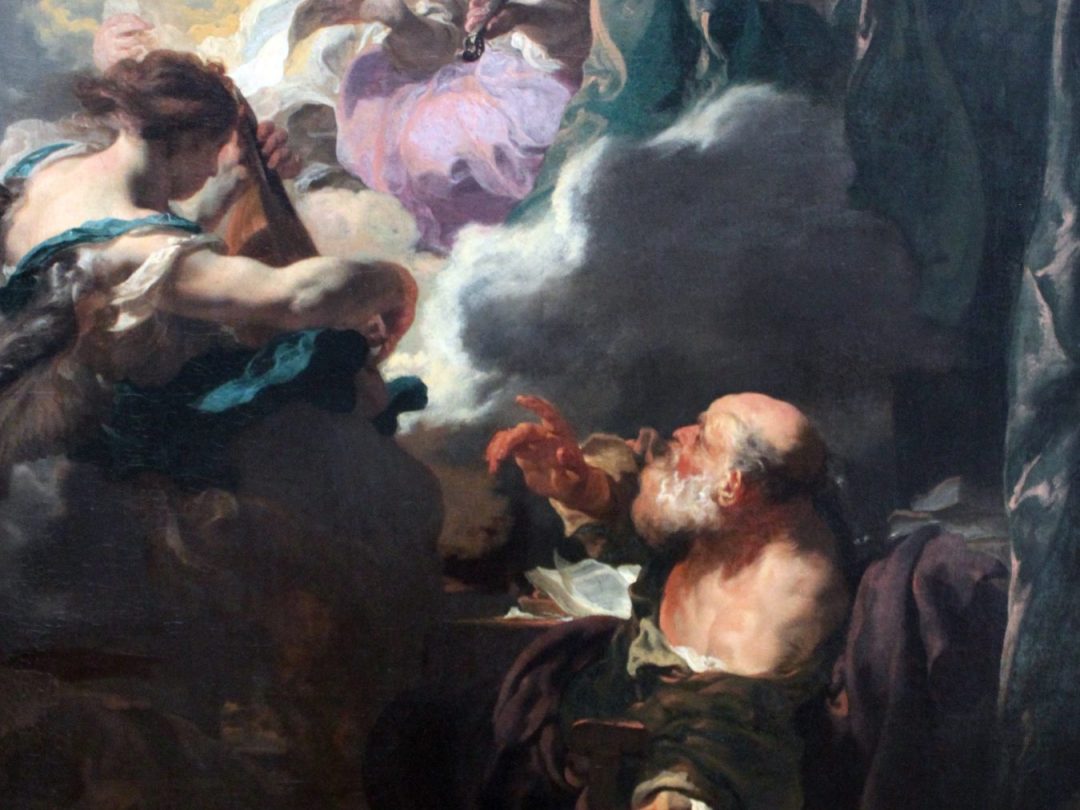
12:1 Must I go on boasting, though there is nothing to be gained by it? But I will move on to the visions and revelations I have had from the Lord.
12:2 I know a man in Christ who, fourteen years ago, was caught up whether still in the body or out of the body, I do not know; God knows-right into the third heaven. (John 4:1-2 tells us he was taken “up here” to Heaven. Some think St. Paul was describing himself in the third person. There is no doubt that this did happen to John.)
12:3 I do know, however, that this same person-whether in the body or out of the body, I do not know; God knows- (This is a profound question. Surprised if Paul did not ask John this question and give his answer.)
12:4 was caught up into paradise and heard things which must not and cannot be put into human language.
12:5 I will boast about a man like that, but not about anything of my own except my weaknesses. (Regardless of whether St. John was taken “up to Heaven” in body or spirit, St. Paul was impressed!)
12:6 If I should decide to boast, I should not be made to look foolish, because I should only be speaking the truth; but I am not going to, in case anyone should begin to think I am better than he can actually see and hear me to be. (Paul offers himself as living proof of his love for God and Truth.)
12:7 In view of the extraordinary nature of these revelations, to stop me from getting too proud I was given a thorn in the flesh, an angel of Satan to beat me and stop me from getting too proud! (People have wondered for 2,000 years what this “thorn in the flesh” was! Was it some illicit desire that he had to control or some sort of physical disorder?)
12:8 About this thing, I have pleaded with the Lord three times for it to leave me,
12:9 but he has said, ‘My grace is enough for you: my power is at its best in weakness’. So I shall be very happy to make my weaknesses my special boast so that the power of Christ may stay over me,
12:10 and that is why I am quite content with my weaknesses, and with insults, hardships, persecutions, and the agonies I go through for Christ’s sake. For it is when I am weak that I am strong. (Every Catholic has at least “one thorn in the flesh” that keeps us from being so proud we don’t think we need God.)
12:11 I have been talking like a fool, but you forced me to do it: you are the ones who should have been commending me. Though I am a nobody, there is not a thing these arch-apostles have that I do not have as well. (The “arch-apostles” were arguing with St. Paul to exalt themselves in a search for approval and/or donations. No one ever won an argument with St. Paul!)
12:12 You have seen done among you all the things that mark the true apostle, unfailingly produced: the signs, the marvels, the miracles.
12:13 Is there anything of which you have had less than the other churches have had, except that I have not myself been a burden on you? For this unfairness, please forgive me.
12:14 I am all prepared now to come to you for the third time, and I am not going to be a burden on you: it is you I want, not your possessions. Children are not expected to save up for their parents, but parents for children. (This is a lesson that all Catholic are blessed to learn.)
12:15 I am perfectly willing to spend what I have, and to be expended, in the interests of your souls. Because I love you more, must I be loved the less?
12:16 All very well, you say: I personally put no pressure on you, but like the cunning fellow that I am, I took you in by a trick. (But, he did not take money from them! That proved his faithful obedience to Jesus as he led entire nations to “Be Catholic”.)
12:17 So we exploited you, did we, through one of the men that I have sent to you?
12:18 Well, Titus went at my urging, and I sent the brother that came with him. Can Titus have exploited you? You know that he and I have always been guided by the same spirit and trodden in the same tracks.
Paul’s fears and anxieties
12:19 All this time you have been thinking that our defense is addressed to you, but it is before God that we, in Christ, are speaking; and it is all, my dear brothers, for your benefit. (There was no “benefit” to St. Paul except the rewards being found in obedience to Jesus.)
12:20 What I am afraid of is that when I come I may find you different from what I want you to be, and you may find that I am not as you would like me to be; and then there will be wrangling, jealousy, and tempers roused, intrigues and backbiting and gossip, obstinacies and disorder. (In 8 words, St. Paul describes what happens when Protestants get people to listen to them!)
12:21 I am afraid that on my next visit, my God may make me ashamed on your account and I shall be grieving over all those who sinned before and have still not repented of the impurities, fornication and debauchery they committed. (Three words describe the sins the 8 words of the previous verse bring many to commit at the behest of those who think they know more than Jesus.)
His final warning: “Examine yourselves to make sure you are in The Faith!”
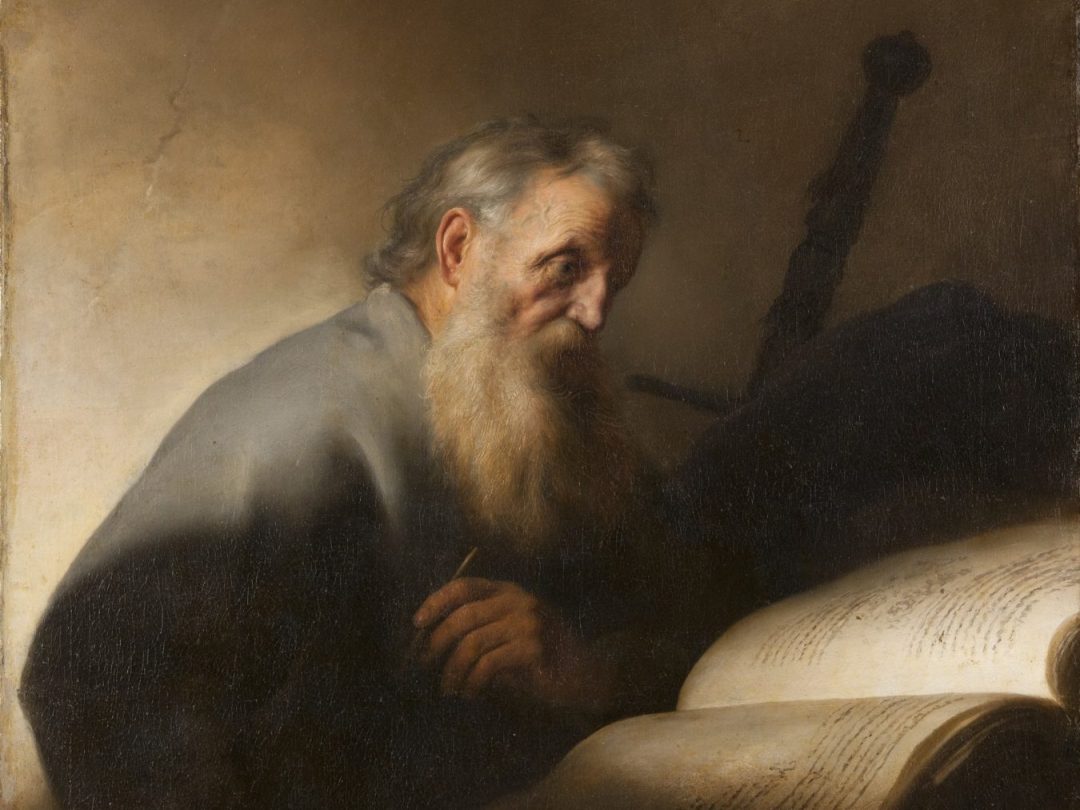
13:1 This will be the third time I have come to you. The evidence of three, or at least two, witnesses is necessary to sustain the charge, (Deuteronomy 19:15)
13:2 I gave warning when I was with you the second time and I give warning now, too, before I come, to those who sinned before and to any others, that when I come again, I shall have no mercy. (Paul, himself, is a “witness two or three times”! In addition, he has other “witnesses” who have told him of the problems cause by those whose vanity led them to think they knew more than Paul.)
13:3 You want proof, you say, that it is Christ speaking in me: you have known Him not as a weakling, but as a power among you?
13:4 Yes, but He was crucified through weakness, and still He lives now through the power of God. So then, we are weak, as He was, but we shall live with Him, through the power of God, for your benefit. (May every Catholic be strong enough to show our “weakness” before Jesus! Obedience to Him is the best way to “benefit” others with the soul-saving belief in, and obedience to, Jesus.)
13:5 Examine yourselves to make sure you are in the faith; test yourselves. Do you acknowledge that Jesus Christ is really in you? If not, you have failed the test, (The final “test” is to “benefit others” by “acknowledging that Jesus Christ is really in us” by receiving The Actual Body and Blood of Jesus Christ by His Miracle of Transubstantiation at every Catholic Mass.)
13:6 but we, as I hope you will come to see, have not failed it. (Paul never failed to glorify every Teaching of Jesus!)
13:7 We pray to God that you will do nothing wrong: not that we want to appear as the ones who have been successful – we would rather that you did well even though we failed.
13:8 We have no power to resist the truth; only to further it. (Every Catholic’s duty is clear in that short Verse!)
13:9 We are only too glad to be weak provided you are strong. What we ask in our prayers is for you to be made perfect.
13:10 That is why I am writing this from a distance, so that when I am with you I shall not need to be strict, with the authority which the Lord gave me for building up and not for destroying.
St. Paul concludes his Second Letter to The Corinthians with recommendations, greeting, and final good wishes:
13:11 In the meantime, brothers, we wish you happiness; try to grow perfect; help one another. Be united; live in peace, and the God of love and peace will be with you.
13:12 Greet one another with the holy kiss. All the saints send you greetings. (As they do to every Catholic for the past 2,000 years.)
13:13 The grace of the Lord Jesus Christ, the love of God and the fellowship of the Holy Spirit be with you all.
(St. Paul’s last letter to THE CORINTHIANS comes to an end with his prayer to the Holy Trinity to help us all be as Catholic as we can.)
Afterword
May all be blessed to have our souls go to God’s Judgment among the grains of “wheat” and not be thrown out in the clouds of “chaff”.
Two things help every Catholic see the confusion of Protestantism :
First, we see the huge stone and brick churches built by prosperous Protestants in every town and city by early followers of Calvin, Luther, Wesley, and other Profiteers of Protestantism. Many of them remain standing. And, mostly empty.
Second: We travel beyond the cities to nearby suburbs. There, offshoots of the already divided denominations built countless thousands of new churches.
All involved in that process sent a clear message to Jesus: “We know so much more than You do that we reject The One, Holy, Catholic, and Apostolic Church that You Spoke Into Being with Your only Church-Creating Word to YOUR First Catholic Pope:
“And I say unto you thou art Peter and on this rock I build My Church and the gates of hell shall not prevail against it. I give you the keys to The Kingdom of Heaven.”
May all be blessed to never let ourselves become insults to, or enemies of, The Divine Perfection of Every Word of Jesus Christ.

